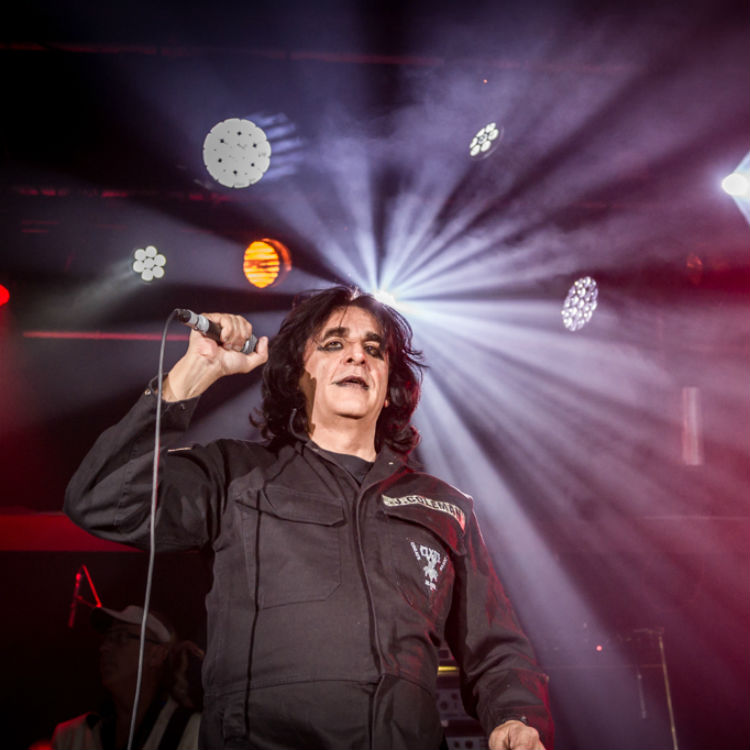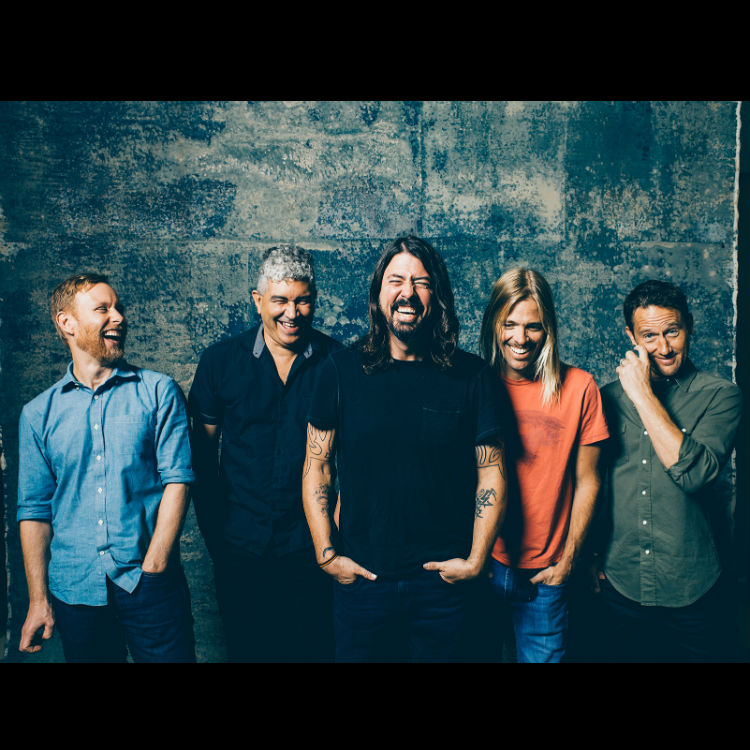 Photo: Tony Jupp
Photo: Tony Jupp
We headed to England's answer to the death of ATP festival last weekend (7-9 October), to discover a ridiculously great line up of new, breakthrough, and established alternative acts.
Only in its second year, Rockaway Beach is independent festival that's showing real promise to be a household name for the future of English music festivals. Here's six things we learned while there.
The headliners were perfect
Saint Etienne, Suede, and Killing Joke was quite a coup to get for a festival with 3,000 people in an English seaside resort in Sussex.
Like the rest of the line-up, it juxtaposed the usual 70s, 80s, 90s pop chart hits that usually populate the Butlins airwaves. One bloke, who looked like he’d lost the rest of his stag do, seemed still in search of that, and acted like he’d come on holiday by mistake: “It’s all right here, like, but I don’t know about the music.”
But for most of the clientele, who’s probably main reason for never going on resort holidays is the bad music, it was a great change. The headliners were a brilliant mix acid house, pop, industrial post punk, and Britpop. In a rare case for a festival the headliners were probably the best band of the day on each of their respective days.
On Friday, St Etienne played their seminal 1991 album, Foxbase Alpha, in full. The post acid house back beat triggered by beatmasters Pete Wiggs and Bob Stanley was a colourful palliate of sound for which the sumptuous combination of Debsey Wikes’, and Sarah Cracknell’s hook-laden vocals to lead off.
It was easy to see why they’re held in the same lofty regard as Happy Mondays and Primal Scream for their joyous indie dance combination. Their sound reflected a time when raving on ecstasy brought about a change in direction in the approach of many songwriters in the early 90s. Out went the retro guitar and in came futuristic electronic production. It may have been 25 years since this album’s release but every bit of this set felt visionary and essential.

On Saturday, Suede played their last gig before disappearing for a couple of years to make another album. And what a way to go out…. They tore through their reserve tanks to give possibly their best performance in years.
It goes without saying that Suede have written some of the greatest songs of any British band ever, and it was no surprise they drew the biggest crowd of the weekend. But thanks to the festival not over-selling, it allowed everyone who was there to get intimately close to the action, without being crushed or not getting into the fairly small stage area.
Especially great was Brett Anderson’s stage presence. Over 20 years of playing at the highest level hasn’t so much worn his energy, but sharpened his every move. I’m not sure if it’s because he was in his home county of Sussex, too, but he gave everything, bounding around the stage to get the crowd to let go of their inhibitions and become as immersed in the music as him.
The set itself was entertainingly dynamic. Hit singles like ‘Trash’, ‘Animal Nitrate’, and ‘Beautiful Ones’ came thick and heavy, creating a joyful sense of union. It was a bizarre privilege hearing such timeless classics in such intimate surrounds. There deserved to be at least 30,000 more people behind me.
Meanwhile, the slower, darker, more harrowing side of Suede was as powerful in its own way. Notably, ‘I Can’t Give Her What She Wants’ was a stand out. It’s one of the most impressive cuts about depression, self-loathing, and loss around. Whether auto-biographical or not, Anderson did an impressive job of making the words in create vivid imagery like a great author would in a book due to his eloquence and conviction of his delivery. Fittingly, gritty shoegaze-y guitars add to colour to the wonderful exploration of the darker depths of his mind.

Industrial post-punk pioneers Killing Joke made for one of the most impressive festival headliners I’ve ever seen. Singer Jaz Coleman, dressed in a black jump suit and decorated with thick black eye liner, gave a menacing performance that reflects his lifelong commitment to pushing the boundaries of what energy a live music gig should entail.
The intensity of Coleman was backed by hypnotically dissonant guitar parts, high tempo synth washes, and rhythms that have elements of funk and disco. They were impossible not to let loose to. For many, Killing Joke was the only band that mattered all weekend. One guy even came all the way from Texas, US, to see their set, and the passion of the most hardcore fans was a pleasure to be around. Moreover, there was an unholy number of moshpits for a Sunday night.
The Killing Joke stage sound was an audiophiles dream. In particular, Geordie Walker’s guitar style though heavy and distorted is a cut above most. The thick semi-hollow body and intricate way he plays the beast, creates a heaviness you want right in your ears. Bognor Butlins has never witnessed anything this brilliant.

There’s nothing trendy about Butlins
In a world where people take snaps their micro brewed beer or their avocado brunch to get ‘likes’ on Instagram on Facebook, Butlins is free from the sort of produce that people fetishize. As one of three remaining resorts in Butlins’ dwindling empire, the gated confines of this purpose built holiday village appear not to have accommodated any food or drink trend since the 90s. There’s Burger King, Papa Johns, Rollover Hotdogs, all-you-can-eat buffets, a Spar, and Carling on tap. The avant-garde of the music bill contrasts bizarrely with the mainstream of said branding, and it’s not exactly the tastiest food in the Kingdom. But It’s refreshingly unpretentious and value for money (a pint under four quid is good these days) compared to the hipster fare that is increasingly populating music festivals.
Arcade games and rock music go hand in hand
On paper, arcade games might not sound that necessary – festivals are fun enough by themselves, right? But after a few beers you quickly rediscover the kid in you and you get all the benefits that you never had in your childhood.
You get your own bank card (for lots of turns), no queues (it’s October and there aren’t any kids on site), and you can hear the likes of Lee Scratch Perry, We Are Scientists and Luna as you pretend to be Rambo or a Motocross champion. You’d have to be pretty zonked out not to enjoy this sort of over stimulation. If arcade games aren’t enough: there’s pool, massive screens to watch the football, bowling, go-karts, 5-a-side courts, and an indoor water park.
Desert Mountain Tribe was one of the most talked about sets
With Fews, Kagoule, and Man Made among also flying the flag for new music at Rockaway Beach, the organisers made some excellent choices. But of the new bands on the list I caught, London-based three-piece Desert Mountain Tribe were the one.
People continually sung their praises around the site and repeated their opinions the next day. Their album is one of the greatest psych/kraut/shoegaze influenced albums of the 21st century – they’ve got a lot more venom than most nu-psych bands.
The solid rhythm section consisting of German brothers Philipp and Felix Jahn vibrated your rib cage with a vengeance – the drummer went for it to the extent the drum kit started to try and run away from him. The crowd became more and more hooked as the hour-long set went on. The tight, chugging riffery and soaring, flashy lead guitar of enigmatic singer Jonty Balls ensured that for a three piece their sound was expansive, and cinematic enough to suggest they’re cut out biggest stages in the world.

The Killing Joke film that took ten years to make was well worth the wait
Through archive and new footage taken assembled over a period of ten years by passionate fan and filmmaker Shaun Pettigrew, The Death and Resurrection is about as fascinating as music documentaries get.
Filmed over six continents, following one of the most controversial bands on the planet through their various peaks and troughs, you get a sense of the complete rollercoaster of a ride it’s been for every band member and the fans.
We learned their political perspective is brave, controversial - and questions everything. Their attitude and sound is an inspiration for a lot of people’s favourite bands. Not least, Nirvana, who directly borrowed the riff for ‘Come As You Are’ from the song, ‘80s’. And Dave Grohl tells Jaz Coleman in the film, that Nirvana used to listen to Killing Joke before hitting the stage, leaving them sweating before the gig even began.
Killing Joke’s interest in the Occult is drawn upon heavily - especially in the first part of the film - and shows how the band transposed the energy summoned in the séances they did at Stonehenge to the stage. This partly gives some indication of why they’re held in such high regard as a live band as in addition to nuanced musical taste and ability, there’s some deep spiritual bonding between the band members that completely amazes people who see them live.
It also follows Coleman’s history in searching for further transcendence and out to Iceland in search of a parallel universe on a glacier where he reached a spiritual pinnacle. Moreover, there’s footage of the pyramids where he recorded an album in a tomb. We learn of Coleman’s history as a classical composer near immediate grasp of Arabian music after studying at the Cairo Conservatoire.
After the film, John Doran of The Quietus was joined by Jaz Coleman and director Shaun Pettigrew for a fascinating Q and A. Coleman spoke heavily about his concern with the state of the world and his anger at the wars going on and came up with some practical ways in which he’s going about changing the world.
Beliveing peace in oneself is the key to going on to then change the world around you, he has built an ashram over in India where he invited fans to go and live without money for a length of time and recharge their batteries - if frayed from the trappings of modern society. He also spoke enthusiastically, twice, about a planned a fishing trip to the Azores where people will join him for fish and chips and a DJ for three days, telling fans to get in touch via Facebook if they want to go.
The late night DJ sets were a triumph
The Centre Stage did brilliantly to keep people in high spirits until 3am. Don Letts, who came to notoriety in the late 70's as the DJ that single handedly turned a whole generation of punks onto reggae, was as slick as you’d expect.
Dom Gourlay of Drowned In Sound followed on from Suede on Saturday night playing some classic hit singles from seven inch vinyl, including: Bowie, The Smiths, Ash, LCD Soundsystem, and The Cure. Gourlay is a regular DJ at Liverpool Festival of Psychedelia , has seen tens of thousands of live gigs, and reviewed 21 festivals this year alone. There are few more trusty hands in Britain for a set at an alternative music festival..
Chris Geddes of Belle and Sebastien, had the more difficult task of keeping people there till the end on a school night. But thanks to some fine niche and classic indie cuts many people stapeled them selves to the dancefloor keeping the embers alive. The regard for quality, even on the graveyard shift, showed a careful attention to detail that was essential to keeping the flow of the festival. What a weekend.













_feb.jpg)




